
Labour Gains, and Pains
20.09.24
A unique reading guide provided by Mark Perryman to the hopes, and fears, of what this Labour government might achieve
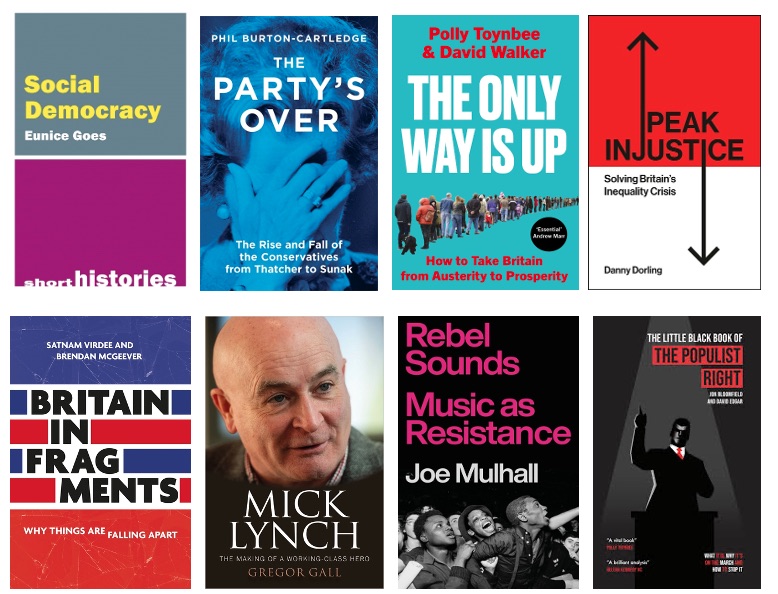
04.07.24 a Labour landslide of historic proportions. We can argue the toss about turnout, vote share, the rise of the Greens, independents taking Labour seats but a Labour win is a win, and perhaps more joyously a Tory defeat, a defeat. Hurrah!
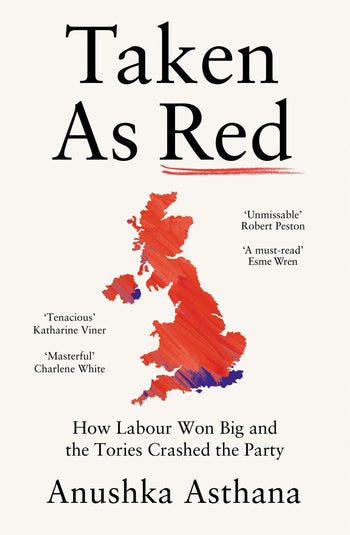
For an instant account of Labour's campaign, look no further than Taken as Red: How Labour Won Big and the Tories Crashed the Party by Anushka Asthana. The access and contacts via Anushka's role as ITV's Deputy Political Editor and prior to that Chief Political Correspondent on The Times opened almost every door imaginable. Readers will have differing views what the many campaign revelations tell us about Keir Starmer's Labour, all will find them spellbindingly interesting!
Of course over its history Labour has spent considerably longer in opposition than in office. For those of a certain vintage the past 45 years scarred in our memory: Wilson/Callaghan 5 years, Thatcher/Major 18 years, Blair/Brown 13 years, Cameron (with a little help from Clegg)/ May/Johnson/Truss/Sunak another 14 years. Add it all up that's 32 years of Tories vs 18 years of Labour. So it seems appropriate to start with Mark Garnett, Gavin Hyman and Richard Johnson's Keeping the Red Flag Flying: The Labour Party in Opposition since 1922. Quite how 'red' that flag has been for the best part of a century readers will no doubt argue the toss over.
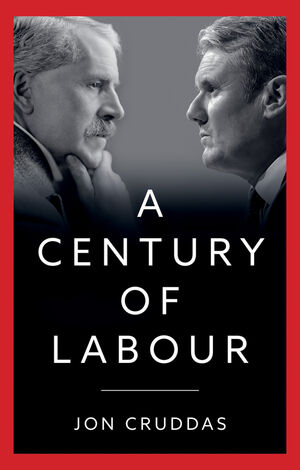
To help settle that never-ending argument look no further than A Century of Labour by Jon Cruddas, marking the centenary of the first Labour government,1924, with an unashamedly partisan account of the party's record when in power ever since. And written by the major figure of the short lived post-Blair 'soft left' the absence of which in the Starmer era has much weakened Labour's well-worn aim to be a 'broad church'. A shorter time span, but one more familiar to most readers, is admirably covered by Patrick Diamond's The British Labour Party in Opposition and Power 1979-2019: Forward March Halted? Though what would the much-missed Eric Hobsbawm, author in 1978 of the original The Forward March of Labour Halted? have made of the Miliband-Corbyn-Starmer years?
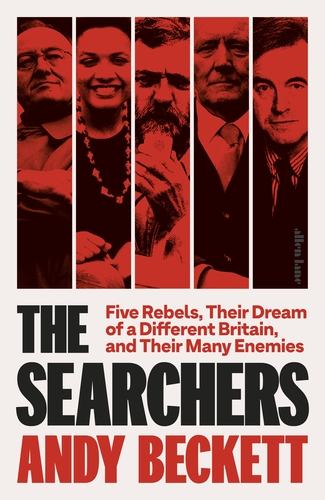
Instead of a broad party Labour has become increasingly polarised with the Labour Right ruthlessly suppressing its opposite number, the Labour Left. Tony Benn, Ken Livingstone, Diane Abbott, John McDonnell and Jeremy Corbyn collectively, the badge 'hard left' worn by all 5 with considerable pride. A tendency that post-Corbyn has gone the same way as the soft left, bordering today on extinction. Andy Beckett tracks the evolution of this tendency through the years of growth, the 1970s framed by the victorious 1972 and 1974 Miners strike and the emergence of Bennism in When the Lights Went Out. And he followed this with Promised You a Miracle the early 1980s reign of Thatcherism triumphant, the Falkands War, the end of the Bennite insurgency and a hapless Labour Party led by Michel Foot. In his new book The Searchers : Five Rebels, Their Dream of a Different Britain, and Their Many Enemies Andy revisits the beginning, middle and end of this history-in-the- making to bring it bang up to date and makes a compelling case for what the party loses when the hard left, from Benn to Corbyn, forced into involuntary absence. A left that whatever its faults, this would be the subject of another book, mixes heady idealism, dogged determination and more fresh thinking than they are often given credit for.
Diane Abbott's memoir A Woman Like Me is an absolute testament to what Labour loses when this narrowing goes unchallenged, recognised across Labour's spectrum with the breadth of resistance to Keir Starmer's ill-conceived plan to ban her from standing in the 2024 General Election. And a book with a rich vein of humour, intended or otherwise. Read Diane's account of her romance with Jeremy Corbyn and just try to stop yourself laughing out loud!
A new generation of thinkers and writers who orient around Labour manage to combine critique with an unwillingness to write off the party in government as an agent of change for the better. Futures of Socialism: 'Modernisation', the Labour Party, and the British Left, 1973-1997 by Colm Murphy expertly tracks the evolving, and sometimes competing, debates as Labour shifted over the course of two and a bit decades from The Alternative Economic Strategy to the abandonment of Clause Four. The shift from Corbynism to Starmerism has been considerably swifter, we await to see for better or worse. Karl Pike in his Getting over New Labour: The Party after Blair and Brown makes a compelling case for not conducting any assessment of Starmer in terms of compare and bombast with 1997-2010. Instead, he urges we understand that while identifying continuities has its place, accounting for the differences is far more interesting, and important.

My stand-out title for making sense of Starmer in power is from Eunice Goes, her short book Social Democracy is a handy ready-reckoner of how social democrats, epitomised today by Keir Starmer and Rachel Reeves, seek to square the circle of the radical and democratic, or as Labour's General Election campaign oxymoronically sloganised 'Change and Stability'.
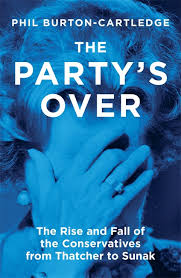
And the Tories? Phil Burton-Cartledge can justifiably say 'I told you so' until the end of his days. The Party's Over: The Rise and Fall of the Conservatives from Thatcher to Sunak was originally published as Falling Down in 2021. Back then Boris Johnson was still basking in the vain glory of his 2019 landslide and the comprehensive breaching of Labour's red wall. Few doubted, certainly not the salaried commentariat, Labour was in dire straits and the Tories set for umpteen more years in power. Phil did doubt, uniquely revealing the underlying trends that would lead not so much as Labour winning in 2024 as the Tories losing.
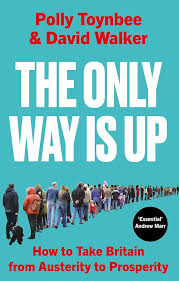
If Labour is to turn 2024 into the basis of a victory that lasts more than anything it must transform an unequal Britain. Polly Toynbee's writing exposing inequality is all the more effective coming as it does not from the oppositional left. Instead she makes a constructive yet not uncritical case why Labour must place the necessity of this transformation at the very centre of politics, gently egging Labour on both to recognise this and act upon. Her latest book, with co-author David Walker, The Only Way is Up : How to Take Britain from Austerity to Prosperity should be essential reading for every Labour MP, adviser and campaigner not only with an eye on winning again in 2029 but why it would deserve to do so.
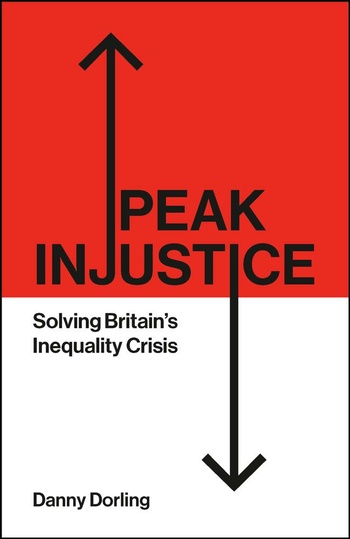
By some considerable distance Danny Dorling is not only the most compelling author on inequality but the most prolific too. In 2023 Danny's Shattered Nation: Inequality and the Geography of a Failing State provided a survey of poverty's impact across all points of Britain, north, south, east and west. A kind of Road to Wigan Pier, with the statistics. Then earlier this year his Seven Children: Inequality and Britain’s Next Generation added a biographical dimension of children's lives and aspirations from across the income bracket that every parent and teacher will readily recognise and any Labour government should seek to change. And now, just in time for when Labour reaches its first 100 days in goverment on 17 October Peak Injustice: Solving Britain's Inequality Crisis a primer of richly ambitious yet entirely practical policy ideas that is essential reading for anyone who wants Labour in power to fulfil its promise of 'change' with changes that rapidly affect for the better those most urgently in need of change.
Mary O'Hara's new book Austerity Bites 10 Years On : A Journey to the Sharp End of Cuts in the UK revisits the places and communities she first wrote about in her 2014 book, Austerity Bites. Since then what has another decade's worth of Tory socially-engineered desolation achieved? Read it and then ponder what Labour in the likely scenario of two terms could achieve in the next decade to reverse this unwanted legacy.
For an account of when governments fail in such a project, and instead cruelly worsen the situation of those who can least afford it The Department: How a Violent Government Bureaucracy Killed Hundreds and Hid the Evidence Disabled activists recently raised the money to deliver a free copy of this extraordinary book of investigative journalism by John Pring, himself disabled, to every one of our 650 MP's. Let's hope they not only read it but act upon it too.
The mining valleys of South Wales occupy a special place in left folklore. The 1926 General Strike, the miners who joined in their hundreds the International Brigade to fight fascism in Spain, the miners strike of 1984-85, and that's just for starters. Brad Evans puts the present, poverty-stricken plight of the valleys in the context of this uniquely heroic past. How Black Was My Valley: Poverty and Abandonment in a Post-Industrial Heartland.
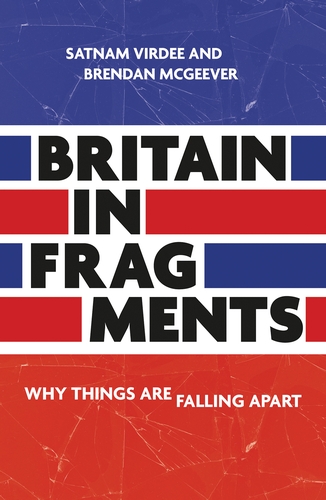
To fully understand 14 years of Tory-engineered inequality Satnam Virdee and Brendan McGeever's all-embracing account, and solutions too, Britain in Fragments: Why Things are Falling Apart is my first choice as a book to read, inform and inspire. They put this entire sorry tale of inequality, injustice and austerity into one single account every bit as much about problem-solving as problem-accounting, no easy task. They achieve it by explaining why democratic reform, the renewal of a failing welfare state, a popular anti-racism, a reinvention of class politics and recovering from the Brexit are all interlinked as solutions to a failing system.
Meanwhile Keir Starmer's in-tray is full of a host of issues each pressing for urgent, and radical, attention. In Louise Haigh, alongside Angela Rayner and Ed Miliband, Keir Starmer's cabinet has at least some breadth of ideas on 'how' though restricted of course by Cabinet rules of collective responsibility. Nevertheless, each has already spearheaded the rapid and radical implementation of policies on transport, green energy and housing.
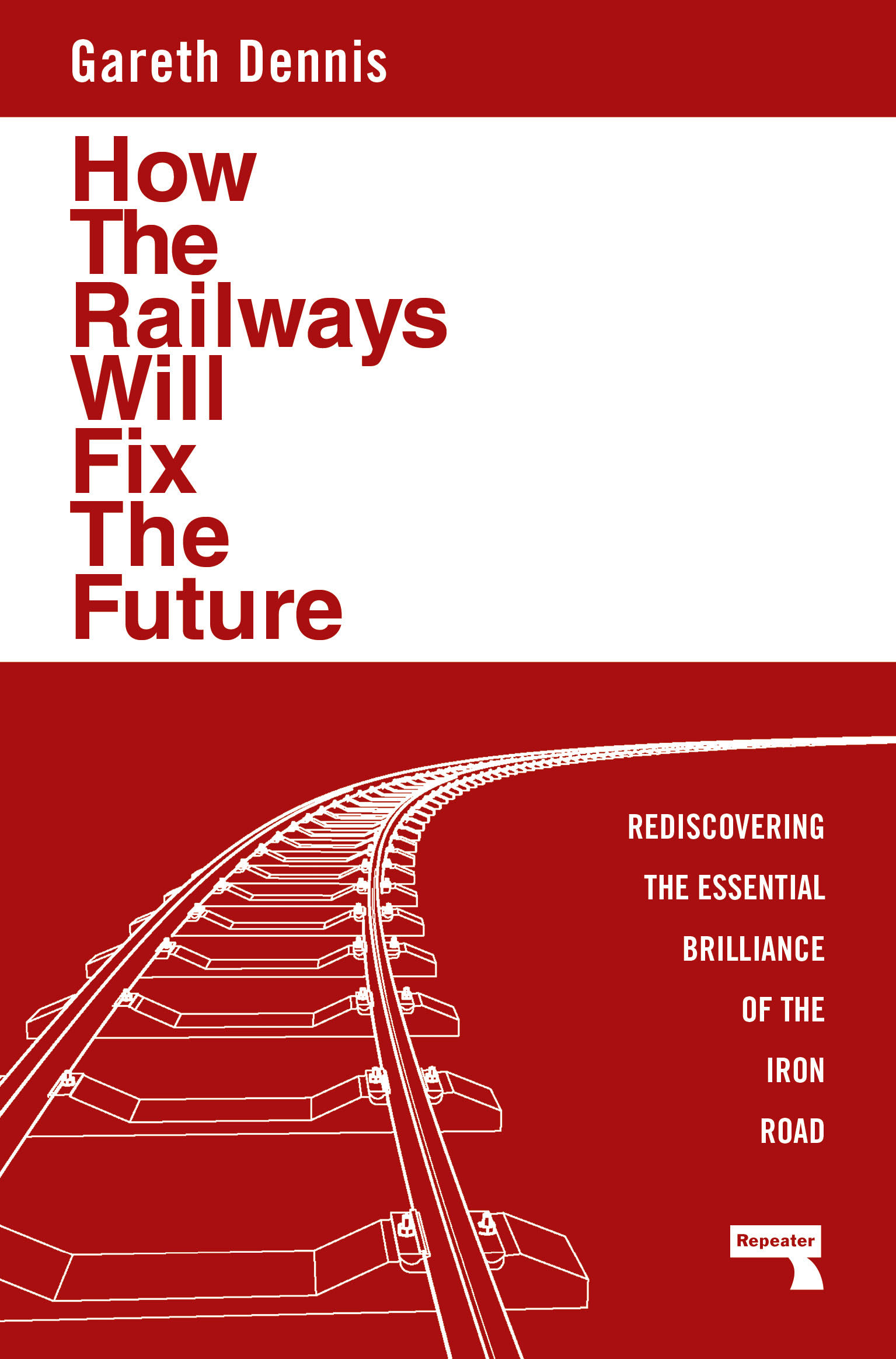
How the Railways will Fix the Future: Rediscovering the Essential Brilliance of the Iron Road by railway engineer and RMT member Gareth Dennis sets out in expert detail the huge potential of an entirely publicly owned train system run for the benefit of serving communities and a key resistance to the rapidly emerging climate emergency. And attractively priced at just £10.99 cheaper than most currently overpriced train tickets.
For a generation of urban voters rent and landlordism is an absolutely central issue. The Rentier State: Manchester and the Making of the Neoliberal Metropolis by Isaac Rose powerfully argues why a direct, statist, challenge to the rental industry would be just about the most popular policy Labour could enact and help restore the party's increasingly fragile support in what were previously Labour's metropolitan urban heartlands. Yes, rent controls and ending no fault evictions are a welcome start but what about who owns the properties in the first place?
Will Labour make such a challenge? Grace Blakely outlines in Vulture Capitalism: Corporate Crimes, Backdoor Bailouts and the Death of Freedom both precisely why it should and won't. From housing to football clubs via high street fast food outlets to almost every part of the country's manufacturing sector our's is an economy, society even, entirely owned by global corporations. And as Grace patiently explains for the non-specialist reader the failure to challenge this salient fact is absolutely central to Labour's inability to recognise how it is neoliberalism that has afforded this takeover.

The Spanish Civil War, the Soviet crushing of the Hungarian revolution, the Vietnam War, Apartheid South Africa, Iraq, each in their different ways shaped a political generation. And each in their different ways distanced that generation from Labourism as an institution, body of ideas and vehicle for undiluted progress. In 2024 Gaza is doing the same. Despite, once again, some early moves in the right direction; the partial arms ban, restoring some humanitarian aid funding, not opposing the legality of the indictment of Netanyahu as a war criminal, for today's political generation this isn't nearly enough from any Labour government and the idea that this disconnect will pass with the passage of time a dangerous fiction. For an insight into why Gaza won't simply disappear as a cause read Gideon Levy's courageously dissenting reportage from inside Israel on both the aftermath to the horrors of 7 October and the punishment of Gaza via mass devastation and indiscriminate killing on an unimaginable scale ever since in The Killing of Gaza: Reports on a Catastrophe. And for the historical background IIan Pappe's Ten Myths about Israel is an absolutely essential read. Note, Gideon and IIan are both Israelis and Jewish, their parents fled Europe to what was then Palestine in the 1930s to escape the Nazis. Remember this when reading these two extraordinary books and the foul assertion that to be a critic of Israel and its guiding ideology, Zionism, is to be antisemitic.
Seeking to muster discontent during Labour's first 100 days will be a diverse range of political forces. Amongst the most vocal, and belligerent will be the placard-providing Far Left of a wide variety of acronyms.
The not much lamented Workers Revolutionary Party (WRP) in the 1980s had a certain political presence via its daily paper Newsline, well-funded local youth-training centres, and its most prominent members, Vanessa Redgrave and her lesser known brother Corin. Behind all this was one Gerry Healy, and when his multiple sins were finally revealed the WRP split in time honoured fashion in multiple directions, all claiming of course, to be the one and only 'true' WRP. The Party is Always Right: The Untold Story of Gerry Healy and British Trotskyism by Aidan Beatty tells this entire sorry tale in highly readable and fascinating detail.
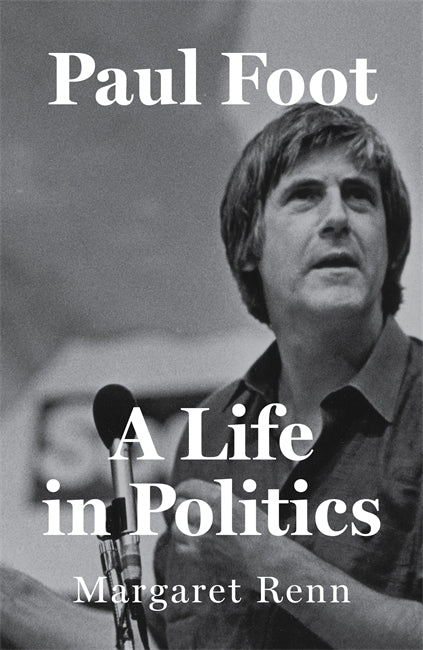
Paul Foot would have denied it vigorously via a vigorous and richly humorous polemic but as a Trotskyist and, to use the vocabulary, 'leading member', for most of his life of a Trotskyist party, in Paul's case, the Socialist Workers Party (SWP), he shared a not entirely dissimilar political disposition to Healy. But then in so many other ways they couldn't be more different. A supremely gifted writer, a dogged investigative journalist exposing injustice where he could find it, his journalism every bit at home in Private Eye, the Daily Mirror, the London Review of Books as Socialist Worker.A revolutionary who counted Shelley and Orwell as much of an influence on his politics as Lenin and Trotsky. And most of all one of the finest and funniest orators for the cause one was ever likely to hear. All this and more retold in Margaret Renn's biography Paul Foot: A Life in Politics.
As for the theorising of the Far Left, much of it I can do without, no thankyou very much. But in amongst the spurious rewrites of 1917, the 2024 version, there is a depth of thinking us lightweight reformists would do well not to dismiss. AntiCapitalist Resistance (yes really) is the stillborn descendant, many splits and versions along the way, of arguably the most creative of the 1968 crop, the International Marxist Group (IMG), best known member another brilliant writer and orator, Tariq Ali. The Resistance (no, don't laugh) have recently published Palestine and Marxism by Joseph Daher which refreshingly free of the 1917 era jargon provides a theoretical framework to understand Gaza a much wider audience than the Far Left would do well to engage with, if not entirely subscribe to.
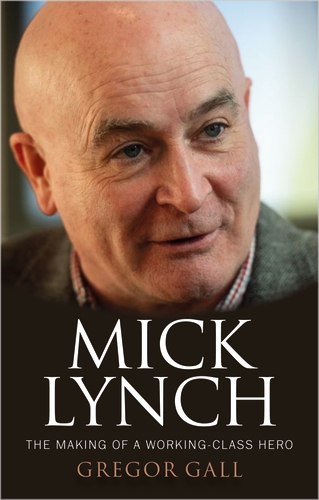
These groups, and as the saying goes there's 57 varieties and counting, number a few hundred members each, only the SWP numbers in the few thousand. None have anything like the reach of the hero of the TV and radio station studio take-down of all things establishment, including the Labour Party establishment, RMT General Secretary Mick Lynch. Gregor Gall's Mick Lynch: The Making of a Working Class Hero meticulously analyses Mick's irresistible rise as the polar opposite to Keir Starer's rise over roughly the same period. Will Mick prove to be Keir's worst nightmare? This is my top choice of a read to gives an understanding of the most effective opposition Keir could face if his promise of change fails to deliver improvements for the many and leaves the few's wealth unscathed (to adapt a Corbynist, via Shelley, slogan). A book which gives a very good idea how Mick, and, arguably the equally combative yet more successful in terms of industrial action, Unite's Sharon Graham, might be key figures to shape precisely this kind of opposition.

Not that a resurgent, and campaigning trade unionism will be sufficient, not by a long way. There is a now a deeply rooted tradition of social movement organising that absolutely must be part, parcel and central to any movement committed to ensuring we receive the very best this Labour government can deliver. That tradition in many ways has its roots in 1970s second wave feminism, the interaction of socialism and feminism epitomised by the publication in 1979 of the path breaking Beyond the Fragments co-authored by Sheila Rowbotham, Lynne Segal and Hilary Wainwright. Sheila revisits the immediate political aftermath of the book's publication in her latest memoir Reasons to Rebel: My Memories of the 1980s a beautifully written reminder for those who were there for the early years of Thatcherism. A brilliantly written social history for those who weren't.
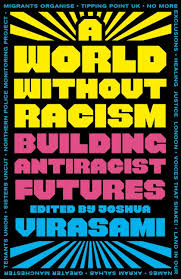
Edited by Joshua Virasami A World Without Racism: Building Antiracist Futures helps us to understand the very welcome fact that in the 2000's antiracism has become every bit as much an irresistible force of change as feminism became in the 1970s, most recently via the huge global response to the Black Lives Matter movement. Joshua has expertly curated a wide range of contributions including on solidarity and internationalism, antiracist tenants movements and organising as migrants that help portray the depth of this welcome shift.
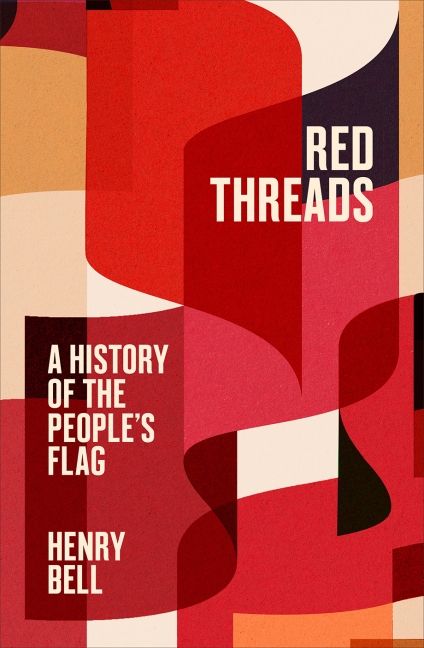
Perhaps what this great movement of a broad church Labour, outside left, trade unions, social movements needs most of all instead of a thought-out plan of action is a banner to rally behind. And fortunately rescued from 'modernisation' and dusted down all ready to go we have one. Red Threads: A History of the People's Flag is a book like no other, Henry Bell's absolutely fascinating history of the Red Flag. C'mon as the song goes, raise the scarlet standard high!
Mmm, maybe even with a techno remix not quite the dance number to get down with Gen Z. Brat? I hardly think so. But at least the thought was there. Or as the anarcho-feminist Emma Goldman famously put it, " If I can't dance, it's not my revolution." Amen to that, well without the anarchism, obviously. No fun, no thanks,
Toby Manning's Mixing Pop and Politics: A Marxist History of Popular Music disavows all this. OK I'll admit 'A Marxist history' doesn't exactly overflow with the pleasure principle I was looking for in a sub-title but stick with it. Over 500 plus pages a soundtrack ranging from doo-wop, soul and psychedelia to glam, punk, rap and grunge had me crying out for more.

The moment this idea ,a guilt-free pleasure in enjoying ourselves as how we 'do' our politics rather than the elevation of a privileged 'activist class' first, and forever after, made sense to me was in Victoria Park, Hackney, Sunday 30 April 1978. The Clash, Tom Robinson Band, Steel Pulse, X-Ray Spex, the first Rock against Racism Carnival. Bablyon's Burning: Music,Subcultures and Anti-Fascism 1958-2020 by Rick Blackman helpfully provides a richly researched hisory of a clash of culture, rebel music and protest politics as an opposition from the 1958 Notting Hill race riots to the rising tide of anti-immigration racism of the current decade.
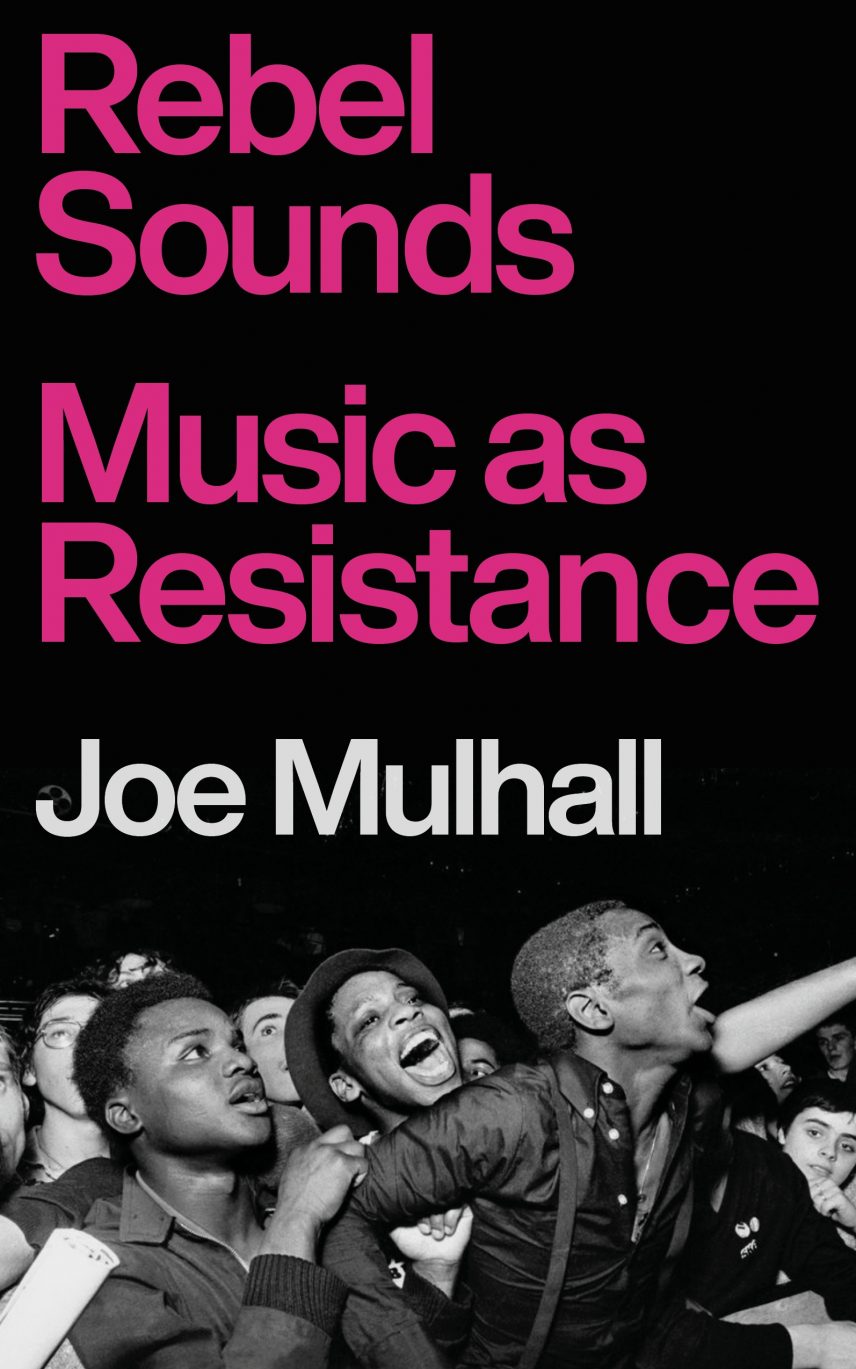
Topping my hit parade for reading on the subject of how pop 'n politics makes has the potential to make such a rich mix Joe Mulhall's Rebel Sounds: Music as Resistance. Best known as a writer and researcher on modern-day fascism there couldn't be a better author to write a counterfactual account of an anti-fascism, and anti a whole lot more too that is rotten in our society, as musical resistance. Global in reach too, Irish rebel songs, the soulful background music to America's civil rights movement, underground gigs in the old Eastern Europe behind the Berlin Wall, the township rhythms that belted out a soundtrack to the toppling of Apartheid South Africa. Joe recounts a politics that looks as good on the dancefloor as on the march.
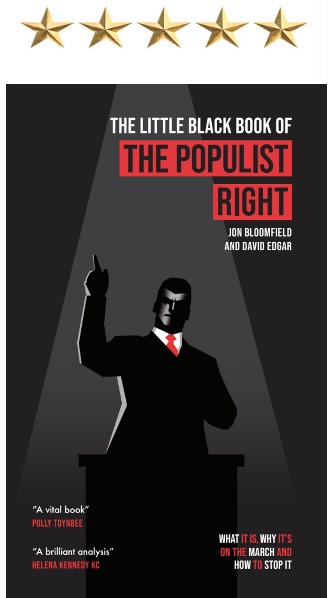
And to complete this reading guide my five star choice for the most essential book to read as Keir Starmer's government heads towards its first 100 days in office? Just 120 pages, easy enough to digest in a single day's reading yet couldn't be more necessary, and urgent, to do so. The Little Black Book of the Populist Right: What it is Why it's on the March and How to Stop it by Jon Bloomfield and David Edgar. Those involved in the August race riots have been clamped down upon, but neither the very real social problems that at least in part sparked the anger behind them nor the racism that used this as a reason to violently lash out at asylum seekers, immigrants and Muslims have gone away. Both the Populist Right and Far Right will be doing their worst to keep this anger at inequality and austerity entirely within a racist narrative. And across Europe it's no better, rather considerably worse: Germany, France, Italy, the Netherlands and in America, Trump. This short but brilliant book is both a road map to the nightmarish future which Labour missteps through these first 100 days could produce and a vital guide to why we don't necessarily have to end up with such a sorry ending by 2029. Read and resist.

The one and only original Keir T-shirt available from here
Note No links in this review are to Amazon. If you can avoid purchasing these books from a site that tax dodges and exploits its workers, please do.
Mark Perryman is currently working on a new book The Starmer Symptom to be published by Pluto in autumn 2025. Co-founder of Philosophy Football, Mark's previous books include The Blair Agenda and The Corbyn Effect.